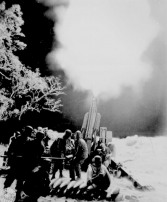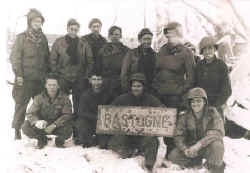|
Bastogne Page How I Heard about the German Breakthrough As a boy on the farm I'd spent untold hours passing a football back and forth through an old rubber tire hanging from a huge limb of a giant elm tree in the farmyard. It hung from a heavy rope, about shoulder high, from the time I was a sixth grader until long after I was out of high school; even after I came home from the war. I think that the great elm died before we cut that tire down. Those were the poor years down on the farm, and small rural school districts likewise were poor. Our small country high school couldn't afford to field a football team, so I grew up without any experience of playing in a real football game. Now here I was in Nancy, France, getting ready to play in my first real football game on the strength of my ability to pass the ball. It was more than just a thrill for me to be on our "Regimental Team" made up of lieutenants, sergeants, corporals and other military officers as well as rank-and-file soldiers. I don't remember all of them by name anymore. I do remember a player from Duke University who was in our line; Sergeant Flores from 'A' Company. Also a Lieutenant Clark from Texas, who had been all Southwest Conference, played. Another officer on our team had played at Clemson University. But the real star of our team was a young man from the University of Nebraska--a Lieutenant Metheeny from "I' Company. He had been the sophomore sensation in 1941 for Nebraska in the Rose Bowl. He was a halfback, and a good one to be sure! I played my heart out, and the game was going fast and furiously when suddenly the loudspeaker system we were using for our game would blast out a call for "Major so-and-so," "Captain so-and-so," "Lieutenant this," and "Corporal that," saying, "You are to report to your squadron at once. On the double!" Looking across the line from us we saw four of their first-line players walk away from the game. Four substitute players ran onto the field, and we continued to play. Several plays later, "Colonel this," "Major that," plus two captains and two more lieutenants were called out of the game. As before, "You are to report to your squadrons at once, on the double!" Two of those officers were on the field when they were called, and two subs ran into the game to take their place. "What the hell is up over at headquarters?" I heard the players on the other side ask the subs. They didn't seem to know, and the game went on. After a few more plays we could hear the roaring of one after another P-47 plane soaring into the sky. More names were called out, and player after player left the game as the P-47 divebombers flew out in a steady stream and the evening went on. Something big was up. That was easy to see. Finally the word came out into the field that there was a big push on and that our side had called for air support. We knew who was doing the pushing-General Patton! The news didn't stop the game, and we kept playing to the end. Sometime late in the game, maybe half way through the fourth quarter, I came out of the game. Captain (now Coach) Swanson called me over to him so he could tell me something. I knelt on one knee next to the coach, who was squatting along by the sideline on our side of the field. He started to show me something on his clipboard when suddenly the lights went out for me! I heard a noise like thundering hooves and then nothing. I vaguely remember seeing Captain Swanson stand up and a surge of humanity moving backwards. The next thing I remember was the faint sound of my name being called. (That same kind of "calling" sound coming from way off in the deep, darkness of an early morning sleep back home on the farm. That was Dad "calling" me before daybreak to get up and do my chores.) I heard that call a long time before I could see. And when I could see, the only thing I could make sense of was the blue, blue sky above and a lot of people's legs in front of me. And then I made it. "Where in the Sam hill have you been, Sergeant Black?" Captain Swanson said to me. "What the devil happened to you anyway? Medic! Someone get the medic over here." Both teams simply had run a play right over me. I can't even recall who had the ball at the time. It goes without saying that the game was over for me. I ended up in the dressing room ahead of everybody else, and for the life of me I don't even remember the score of the game, or much that happened for quite sometime after. My face was covered with blood, my nose was broken and cut pretty bad. My cheek and forehead had the signs of a pretty good raspberry on them. To be perfectly honest, I looked like hell and felt worse. I had had my helmet off and I must have caught someone's shoulder pad straight in the face as he was going full tilt down the side of the field. I was slammed several rows back in behind the big crowd of standing Air Force soldiers. So ended my football playing days. I was patched up, but I didn't get a chance to have my broken nose set at the field hospital. "Someone back at the camp hospital will have to do that," our medic said. By the time all of this started to ring clear, the celebration had gotten underway. The Air Force was wining and dining us paratroopers in their style, which was tops for any of the services, by far-even after having beaten them on the gridiron! I can't remember what we had for chow that Sunday night of December 17, 1944. But I can tell you we ate off of clean white tablecloths and used regular table silverware, plus white china cups for our coffee. We had cake and ice cream as well. Then it was off to the service clubs for beer and dancing. The Air Force even furnished the girls; local French ladies from Nancy. By 8 o'clock my nose didn't hurt any more. As a matter of fact, this was turning into the best day I'd ever spent in this man's army, in spite of the broken nose. Just before I fell asleep I heard loud talking downstairs in the club. I could hear the on duty Air Force troops going around putting the base on alert. Their words were clear. "There has been a breakthrough, and paratroopers have been dropped." "Hey down there!" I yelled. "What's going on? Anything we ought to know about up here?" I woke up everyone. "Who in hell are those guys upstairs?" I heard someone say. "They are those football players from the 101st Airborne, our paratroopers," someone said. "Paratroopers? 101st Airborne? They have been put on alert. Haven't they left yet? Go wake them up! They have got to get back to their camp!" That's how I heard about the German breakthrough . . . (from the openning of Chapter 21--"How I Heard about the German Breakthrough") To place an order---click here 
Night Artillery Around Bastogne 
In Bastogne December, 1944 © Copyright 1998-2001, All Rights Reserved. |

